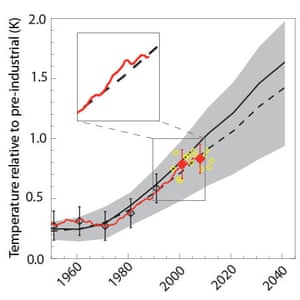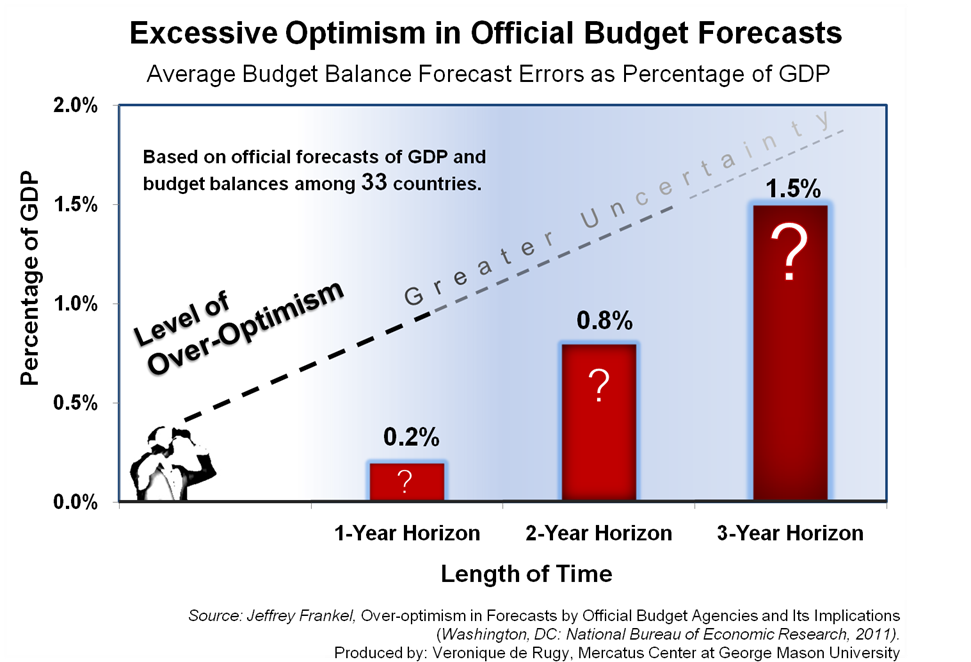History of economic forecasts "a complete failure" says Nate Silver - Yahoo Finance
Forbes magazine agrees:
The Economic Forecasts are Wrong, Which is Probably Good News - Forbes
As does the font of all things 'Austrian' in the field of economics:

Astrologers, palmists, and crystal-ball gazers are scorned while professional economists are heralded for their scientific achievements. Yet the academics are no less mystical in trying to predict the direction of interest rates, economic growth, and the stock market.
Forbes magazine agrees:
The Economic Forecasts are Wrong, Which is Probably Good News - Forbes
As does the font of all things 'Austrian' in the field of economics:

Astrologers, palmists, and crystal-ball gazers are scorned while professional economists are heralded for their scientific achievements. Yet the academics are no less mystical in trying to predict the direction of interest rates, economic growth, and the stock market.
"The economic future, like the political future, will be determined by future human behavior and decisions. That is why it is uncertain. And in spite of the enormous and constantly growing literature on business cycles, business forecasting will never, any more than opinion polls, become an exact science."
Mises Daily | Mises Institute
Or as Harvard economist Jeffrey Frankel’s paper on the unreliability of economic forecasting put it:
And yet when it comes to forecasting climate change, the figures are much more reliable - as these scientific journals recount:
On the reliability of seasonal climate forecasts | Journal of The Royal Society Interface
AMS Journals Online - Toward Seamless Prediction: Calibration of Climate Change Projections Using Seasonal Forecasts

The climate forecast published in 1999 is showed by the dashed black line. Actual temperatures are shown by the red line (as a 10-year mean) and yellow diamonds (for individual years). The graph shows that temperatures rose somewhat faster than predicted in the early 2000s before returning to the forecasted trend in the last few years. Photograph: Nature Geoscience
Or as Harvard economist Jeffrey Frankel’s paper on the unreliability of economic forecasting put it:
And yet when it comes to forecasting climate change, the figures are much more reliable - as these scientific journals recount:
On the reliability of seasonal climate forecasts | Journal of The Royal Society Interface
AMS Journals Online - Toward Seamless Prediction: Calibration of Climate Change Projections Using Seasonal Forecasts

The climate forecast published in 1999 is showed by the dashed black line. Actual temperatures are shown by the red line (as a 10-year mean) and yellow diamonds (for individual years). The graph shows that temperatures rose somewhat faster than predicted in the early 2000s before returning to the forecasted trend in the last few years. Photograph: Nature Geoscience
Test of a decadal climate forecast : Nature Geoscience
This is how the New Economics Foundation recently summarised things:

Climate change: the forecasts are accurate, unfortunately | New Economics Foundation
The NEF has been saying this for some time now:

Model behaviour | New Economics Foundation
.
.
.
This is how the New Economics Foundation recently summarised things:
Climate change: the forecasts are accurate, unfortunately

Photo credit: Alan Tunnicliffe
JANUARY 20, 2015 // BY: GRIFFIN CARPENTER
Recent stories about inflation, the deficit, exchange rates, oil prices, or any number of other economic indicators might have left you thinking that economists often fail to predict change before it happens.
And as it turns out, you’re not far off. Much has been written about the dramatic fall in oil prices to under $50 a barrel. Not only were short-term forecasts extremely off the mark, but according to long-term forecasts from the Energy Information Agency, we were supposed to have been living in a world where oil cost $20-40 a barrel for the last two decades.
Depending on which market forecast you happen to be reading, in the coming year, the price of oil may fall below $20 a barrel, or it may rocket back up to $100 a barrel. With this confusion and track record (as reflected in other key indicators), it’s a wonder that economic forecasts are trusted at all.
Contrast this with another piece of news. Just days ago the leading meteorological organisations announced that 2014 was the hottest year on record. While there is always year-to-year variance in weather patterns, this record did not come as a surprise to climatologists at the Intergovernmental Panel on Climate Change as climatologists have has been producing forecasts for over two decades that show a trend of ever-increasing global temperatures.
Last year we produced research showing that long term climate forecasts perform at least at well as long term economic forecasts. And as expected, new data from 2014 shows that the story remains the same. Uncertainty cannot be used as an excuse for climate inaction, as climate forecasts are at least as accurate as the economic forecasts that are used and accepted in long-term decision making every day.
This result is clear from graphs showing the trend forecasted, versus actual observations, and through the statistical tests of forecast accuracy.Click below to enlarge.
Note: The Office for National Statistics and the HM Treasury did not provide a range for their respective forecasts of population in 1996 and debt/GDP in 1998. This does not impact the statistical tests as annual observations are compared to the midpoint of the forecast.
While there are still a few voices in the media and online that remain skeptical of climate change, there comes a point when effort must move away from convincing the last remaining stalwarts and focus instead on implementing practical solutions. There is hope that 2015 can mark this transition from acceptance to action. Negotiations at the recent climate talks in Warsaw and Lima have been laying the groundwork for the “deadline” negotiation in Paris later this year. Just as there is certainty in the accuracy of climate forecasts, there is also certainty that further inaction on climate change will cause more record temperatures in the future.
ISSUES
Climate change: the forecasts are accurate, unfortunately | New Economics Foundation
The NEF has been saying this for some time now:
Model behaviour

KEY FINDINGS▼
- Early climate models accurately predicted how our climate has changed in the last 20 years.
- Climate models have proven to be more reliable than many long term economic forecasts used and trusted by policymakers.
- Climate sceptics’ attempts to discredit climate models exaggerate minor errors while ignoring broader trends.
Photo credit:  James Willamor
James Willamor
MARCH 11, 2014 // WRITTEN BY:
Every day, major economic decisions are made based on advice no more accurate than a coin flip. But when it comes to climate change, sceptics and media are fuelling distrust in forecasts that now have a 20-year track record of accuracy. It’s time to end the double standard in how our most important decisions are made.
Uncertainty is the new denial
Model behaviour | New Economics Foundation
.
.
.






No comments:
Post a Comment